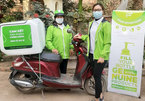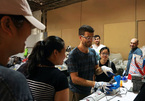 |
|
Household waste, stored in plastic bags, is piled in Hoang Van Thai Street, Hanoi.
|
Phạm Huy, a small trader in a traditional market in Long Biên District, said plastic bags and products were selling in large quantities in local markets because they were not only cheap but also convenient.
It costs VNĐ30,000 (US$1.3) per roll of 100 plastics bags and VNĐ20,000 ($0.8) for 50 plastic cups, he said.
Huy said the number of people shopping at the market was very large and most of them asked for plastic bags. Few people carried their own bags to the market.
“If we do not use plastic bags, we have nothing to store things for our customers,” he said.
An owner of a food shop in Quán Thánh Street, Ba Đình District, said his customers often asked for takeaway food in plastic containers.
Although he knew of the impacts of plastic bags and products on the environment, he still bought them to store food for his customers, he said.
Hồng Hà, a resident of Ba Đình District, said due to the impacts of the COVID-19 pandemic, food and beverage outlets had to close and only sell online.
People often ordered using popular applications such as Grab and Now to eat and drink at home, she said.
The shops often used plastics bags and products to wrap up their wares for shippers to bring to customers, she said.
Solutions
Lê Tuấn Định, deputy head of the city’s Natural Resources and Environment, said it was estimated that about 6,000 tonnes of waste were discharged daily in the capital, including 60 tonnes of plastic waste.
Plastic waste discharge was believed to increase year after year, adversely affecting the environment, he said.
In response to the situation, the city administration views combating plastic waste as a key task.
In 2019, the city issued Plan No 232/KH-UBND on 'Preventing plastic waste and bags by 2020, a vision towards 2025', calling on local administrative and public service agencies and State-owned enterprises not to use disposable plastic products and plastic bags, as well as mobilising organisations and individuals to say no to disposable plastic products.
The department has relevant agencies to strengthen dissemination to improve people’s awareness of the impacts of plastic waste on the environment. The agencies were told to find alternative materials to reduce the use of plastic products.
He said the department would conduct surveys on the use of disposable plastic products and the demand for recycled products to find alternative products to replace disposable plastic in local traditional markets and trade centres.
The department also compiled mechanisms to support enterprises to manufacture environmentally-friendly packaging, he said.
It was strengthening inspections and encouraging enterprises to manufacture environmentally-friendly packaging and pilot training programmes to improve capacity to design environmentally-friendly products for commercial, service and manufacturing facilities in the city.
According to the United Nations Environment Programme (UNEP), around the world, 1 million plastic drinking bottles are purchased every minute, while 5 trillion single-use plastic bags are used worldwide annually. In total, half of all plastic produced is designed to be used only once and then thrown away. — VNS

University lecturer works to reduce plastic waste
A Vietnamese university lecturer has won a prize in the UNDP’s Ending Plastic Pollution Innovation Challenge.

A second life for plastic waste
Nestor Catalan, a Spanish man who has been living in Vietnam for many years, is determined to spend the rest of his life working for what he deems meaningful projects. PLASTICPeople is one of them.